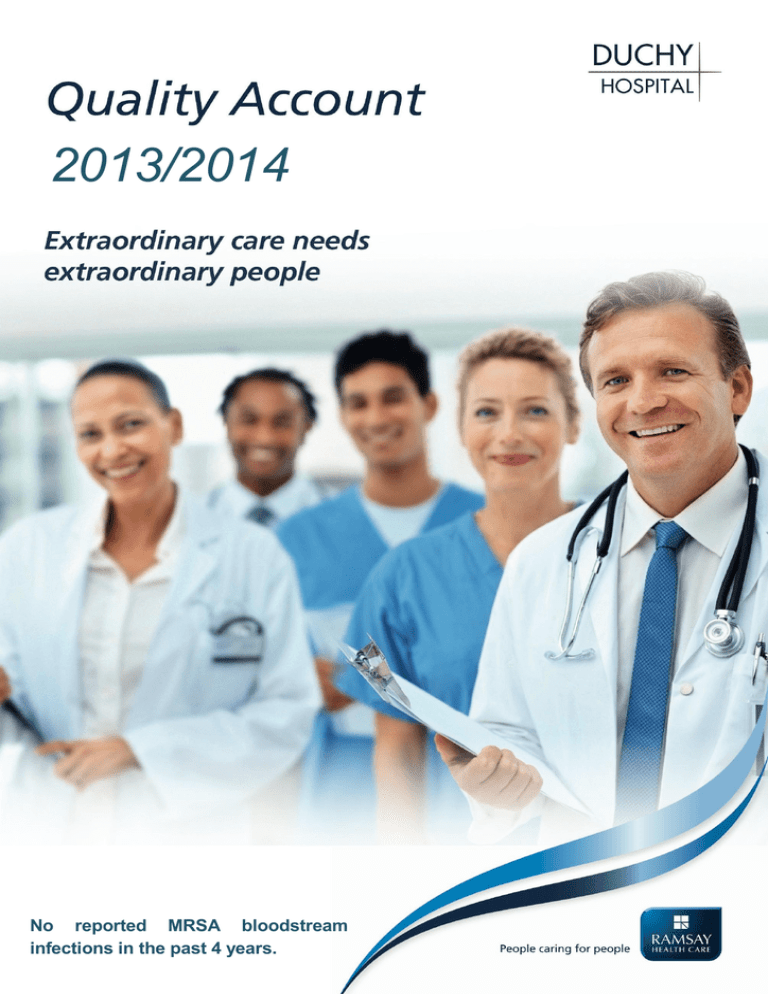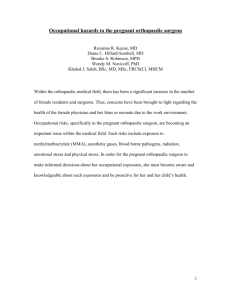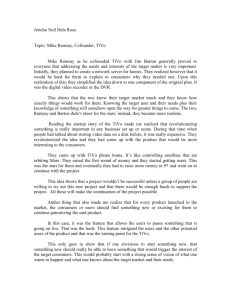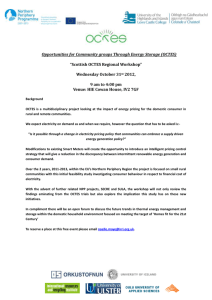2013/2014 No reported MRSA bloodstream
advertisement

2013/2014 No reported MRSA bloodstream infections in the past 4 years. Contents Introduction Page Welcome to Ramsay Health Care UK and Duchy Hospital Introduction to our Quality Account PART 1 – STATEMENT ON QUALITY 1.1 Statement from the General Manager 1.2 Hospital accountability statement PART 2 2.1 Priorities for Improvement 2.1.1 Review of clinical priorities 2011/12 (looking back) 2.1.2 Clinical Priorities for 2012/13 (looking forward) 2.2 Mandatory statements relating to the quality of NHS services provided 2.2.1 Review of Services 2.2.2 Participation in Clinical Audit 2.2.3 Participation in Research 2.2.4 Goals agreed with Commissioners 2.2.5 Statement from the Care Quality Commission 2.2.6 Statement on Data Quality 2.2.7 Stakeholders views on 2011/12 Quality Accounts PART 3 – REVIEW OF QUALITY PERFORMANCE 3.1 Patient Safety 3.2 Clinical Effectiveness 3.3 Patient Experience Appendix 1 – Services Covered by this Quality Account Appendix 2 - Consultants and staffing Appendix 3 – Clinical Audit Programme Welcome to Ramsay Health Care UK Duchy Hospital is part of the Ramsay Health Care Group. The Ramsay Health Care Group was established in 1964 and has grown to become a global hospital group operating over 100 hospitals and day surgery facilities across Australia, the United Kingdom, Indonesia and France. Within the UK, Ramsay Health Care is one of the leading providers of independent hospital services in England, with a network of 22 acute hospitals. We are also the largest private provider of surgical and diagnostics services to the NHS in the UK. Through a variety of national and local contracts we deliver 1,000s of NHS patient episodes of care each month working seamlessly with other healthcare providers in the locality including GPs, PCTs and acute Trusts. Ramsay Health Care UK is committed to establishing an organisational culture that puts the patient at the centre of everything we do. As Chief Executive of Ramsay Health Care UK, I am passionate about ensuring that high quality patient care is at the centre of what we do and how we operate all our facilities. This relies not only on excellent medical and clinical leadership in our hospitals but also upon our overall continuing commitment to drive year on year improvement in clinical outcomes. As a long standing and major provider of healthcare services across the world, Ramsay has a very strong track record as a safe and responsible healthcare provider and we are proud to share our results. Delivering clinical excellence depends on everyone in the organisation. It is not about reliance on one person or a small group of people to be responsible and accountable for our performance. Across Ramsay we nurture the teamwork and professionalism on which excellence in clinical practice depends. We value our people and with every year we set our targets higher, working on every aspect of our service to bring a continuing stream of improvements into our facilities and services. Jill Watts, Chief Executive Officer of Ramsay Health Care UK Introduction to our Quality Account This Quality Account is Duchy Hospital’s annual report to the public and other stakeholders about the quality of the services we provide. It presents our achievements in terms of clinical excellence, effectiveness, safety and patient experience and demonstrates that our managers, clinicians and staff are all committed to providing continuous, evidence based, quality care to those people we treat. It will also show that we regularly scrutinise every service we provide with a view to improving it and ensuring that our patient’s treatment outcomes are the best they can be. It will give a balanced view of what we are good at and what we need to improve on. In 2009/10 the Quality Account was developed by our Corporate Office and summarised and reviewed quality activities across every hospital and centre within Ramsay Health Care UK. It was recognised, however, that this didn’t provide enough in depth information for the public and commissioners about the quality of services within each individual hospital and how this relates to the local community it serves. Therefore, each site within the Ramsay Group developed its own Quality Account for 2010/11 and this account for 2012/13 is the Duchy Hospital’s third submission. Part 1 1.1 Statement on quality from the General Manager Welcome to Duchy Hospital’s quality account. This report outlines the Hospitals approach to quality improvement, progress made in 2012-13 and plans for the forthcoming year. Duchy Hospital has five key values which underpin everything we do as an organisation: • Put the patient first • Work as one team • Respect each other • Strive for continual improvement • Respect environmental sustainability The aim of our Quality Account is to provide information to our patients and commissioners to assure them we are committed to making progressive achievements. For example, we participate in the Health Protection agency’s Surgical Site Surveillance Service and our surgical site infection rates are significantly lower than the national average. Our emphasis is on ensuring patients receive safe and effective care, that they feel valued and respected in decisions about their care and are fully informed about their treatment at each step of the pathway. The experience that patients have in our hospital is of the utmost importance and we are committed to establishing an organizational culture that puts the patient at the centre of everything we do. As well as being treated quickly and safely, our patients receive a personalised service, enhanced by good communication and a commitment to ensuring their privacy and dignity are respected at all times. High quality patient care is at the centre of what we do and how we operate our hospital. To do this we rely on excellent medical and clinical leadership plus an overall continuing commitment to drive year on year improvement in clinical outcomes. We especially value patient’s feedback about their stay, treatment and clinical outcome. In the last year we have taken part in the NHS Inpatients survey and received excellent feedback. We are also delighted that the Health Gain scores for our joint replacement patients were amongst the best in the country. Chris Sealey, Hospital Manager 1.2 Hospital Accountability Statement To the best of my knowledge, as requested by the regulations governing the publication of this document, the information in this report is accurate. Chris Sealey, General Manager Duchy Hospital Ramsay Health Care UK This report has been reviewed and approved by: Miss Bates, Consultant Gynaecologist, Medical Advisory Chair Mr Kumaravel, Consultant Ophthalmic Surgeon, Clinical Governance Committee Chairman Helen White, Regional Director, Ramsay Health Care UK Welcome to Duchy Hospital Duchy Hospital, one of the South West’s leading independent hospitals, provides medical and surgical services as outpatient or planned admitted care for adults and older children; the full range of specialties offered is shown at Appendix 1. Where clinical need requires it, our team of well trained, competent and experienced staff provide 1:1 care, Level 2 critical care. In the unlikely event of that a higher level of care becomes necessary, Level 3 Critical Care; there is a transfer arrangement in place with Royal Cornwall Hospitals NHS Trust. Paediatric trained nurses are available to care for those under the age of 18 years. Additional onsite facilities include cosmetics, radiology, physiotherapy, mobile and MRI/CT. We work closely with the Royal Cornwall Hospital NHS Trust which provides our blood transfusion, pathology, and some pharmacy services. On the 8 April 142 Consultants were registered as approved to practise at Duchy Hospital. The full list of consultants with practising privileges along with a comprehensive list of the disciplines and numbers of staff employed as of April 2013 can be found at Appendix 2. We pride ourselves on the delivery of high quality, safe, effective care in a manner and environment that respects and protects the privacy and dignity of our patients be they medically insured, self-funding or referred by the NHS. Our facilities and clinical and support services are continually monitored to ensure that we are offering the very best service to our patients. At the start of 2012 the Duchy had 34 beds, a day case lounge with 7 recliners, 2 theatres, both with laminar flow, and a fully equipped endoscopy unit. During the year significant investment has been made and extensive development taken place. Whilst the number of inpatient beds had reduced to 28, the hospital now boasts a third laminar flow theatre, a purpose built Ambulatory Care facility, a cardiac catheterisation laboratory and additional outpatient consulting rooms and treatment facilities. Although it was anticipated that all of the building work would be completed by the end of 2012, the final phase of improvements to the main entrance, reception and waiting areas will come to fruition in early summer 2013. During the year from April 2012 to 31st March 2013 5,974 patients received treatment here as day-cases or inpatients of which 4,099 were NHS patients (68%); of those 4,099 69% were treated as day cases compared to 66% last year. Only 25% of the day case patients were treated on the inpatient ward compared to 52% in the previous year. This has had a major impact on how efficiently the attendance and stay of these patients is managed. Mrs Miranda Field is our GP Liaison Officer. Miranda has close contact with both the practice managers and the GPs at our practices throughout Cornwall. She organises regular “Lunch and Learns”, taking Consultants into GP surgeries to offer training and latest development awareness as well as running evening GP training seminars on a regular basis. We value our contact with GPs as “customers” and strive to ensure we actively work in partnership with them to enhance patient care. Dr Andrew Craze, local GP, is a member of the hospital’s Medical Advisory Committee (MAC). The Duchy management team is also working hard to establish a good relationship with Kernow Clinical Commissioning Group which took over responsibility for commissioning health care services for the people of Cornwall on 1 April 2013. We work closely with the Royal Cornwall Hospital NHS Trust which provides us with blood transfusion, pharmacy services and access to level 3 critical care services. Part 2 2.1 Priorities for improvement On an annual cycle, Duchy Hospital develops an operational plan to set objectives for the year ahead. We are committed to respecting privacy and dignity, and providing safe, effective treatment for all those who receive care from us, be they our private patients or those for whom services are commissioned by the NHS. We constantly strive to improve clinical safety and standards through a systematic process of governance which includes audit and feedback from all those experiencing our services. Priorities are determined by the hospitals’ Senior Management Team taking into account patient feedback, audit results, national guidance, and the recommendations from various hospital committees which represent all professional and management levels. Most importantly, we believe our priorities must drive patient safety, clinical effectiveness and improve the experience of all people visiting our hospital. 2.1.1 A review of clinical priorities 2012 /13 World Health Organisation (WHO) Surgical safety checklist – completion of the checklist is a key safety element for patients undergoing surgical procedures at Duchy. All grades of clinical staff have been involved in achieving this aim and we have worked with both our Corporate Clinical team and our local Trust to share training packages and audit tools. Proper completion of the WHO checklist is audited regularly and the results are consistently over 90% compliance. The results of these audits will be submitted to Kernow Clinical Commissioning Group quarterly and will form part of its quality monitoring process for Duchy clinical services during 2013/14. Venous-thromboembolism event (VTE) - which includes deep vein thrombosis (DVT) and pulmonary embolism (PE), is universally recognised as a significant patient safety issue. The Duchy Hospital has established a robust policy and processes to ensure it can comply with NICE guidelines in order to reduce avoidable death, disability and chronic ill health from VTE. We have reduced the variance of prophylactic measures used at Duchy Hospital in order to minimise human error and allow outcomes to be measured. The hospital has an excellent VTE risk assessment compliance record. Data submitted to UNIFY, a Department of Health national reporting system shows 98% achievement from April 2012 to February 2013 inclusive 2012/13 - UNIFY VTE Submissions March data excluded as not yet available. Never events – completely avoidable, significant safety events. Preventative measures have been implemented and there have not been any “Never events” at Duchy in this reporting year. Cleanliness and infection prevention - There have been no MRSA bacteraemia at the hospital for over four years, or C Difficile infections at Duchy Hospital. However we are not complacent and we continue to screen all patients for MRSA prior to admission to Duchy and all staff have a mandatory requirement to undertake hand hygiene training. We maintain our regular audit programme which includes hand hygiene, urinary catheter and intravenous line care, and our cleaning standards and physical environment. We participate in the Health Protection Agency data collection for surgical site infections following hip and knee joint replacements and we have not had cause to report any infections to the HPA during the last year. Meeting endoscopy standards – we have made good progress towards achieving JAG accreditation (Joint Advisory Group for GI endoscopy). An endoscopy lead nurse is in post and we submit data in line with the Global Rating Scale (GRS) initiative for endoscopy. We will be formally assessed for JAG accreditation during 2013 Releasing Time to Care (formerly known as The Productive Ward)– the Duchy staff have continued to implement ways of working which enable clinical staff to spend more time delivering patient care. The amount of non-clinical administration has been reduced by taking on additional administrative staff, and multi-disciplinary patient documents are now kept at the bedside to support good, contemporaneous record keeping and communication; this reduces the time spent on verbal questioning and handover, and supports consistent care. Risk Management – During 2012 Ramsay UK introduced a new risk management reporting system, called RiskMan, across the company. This has enabled us to record and analyse clinical and other incidents and service user feedback with a much greater degree of accuracy. There is now an improved ability to identify areas concern relating to patient safety and calculate any trends. Using this system Duchy has seen the total number of incidents reported rise but with the significant majority of incidents are classified as not causing harm to anyone. This is an indicator of a safety conscious organisation; one which is willing to report and analyze all incidents, whether they cause harm or not to ensure we learn and improve further. This information is shared with the PCT Quality team to provide assurance of the safety of our services and allows us to be benchmarked against other providers. We will continue to share this type of information with Kernow Clinical Commissioning Group during 2013/14. Vulnerable adult, Deprivation of Liberty and Child protection – the hospital takes its responsibility for safeguarding vulnerable members of society seriously. Equality, diversity and human rights are a theme running through Ramsay Health Care. The organisation’s integrated governance framework, Group policies and practice comply with current legislation. All staff working within the hospital are required to have a standard or, in the case of those with patient contact, an enhanced CRB check. They receive in-house education about Equality, Human Rights and workplace Diversity, vulnerable adult care, deprivation of liberty and child protection training. In addition, during 2012 senior nursing staff received external safeguarding training from the local council Safeguarding Adults team to improve their awareness of multi-agency safeguarding policy and procedure in Cornwall. During 2012/13 staff contacted the Cornwall Safeguarding Children’s team for advice on one occasion, the circumstances related to domestic arrangements rather than any event within the hospital, but no Safeguarding Alerts have been made. An unannounced visit on 21st November 2012 by PCT sponsored Dignity in Care Assessors, found that staff had a high level of respect for patient’s privacy and dignity. National Joint Register – The National Joint Register records the details of patients undergoing major joint replacement surgery and the type of prosthesis (new joint) they are given. This system is invaluable when there are nationally identified concerns such as the recent ‘metal on metal’ hip joint alert; patient’s details are only added to this register with their written consent. We continue to submit data to the NJR. The key performance benchmark for NJR consent is 95%. Duchy consistently scores in excess of 90% Data is 2012/13 - NJR Submissions Competency training – ensuring well trained, competent staff are available to care for patients is a high priority at Duchy Hospital. This year the staff have undertaken competency based training in “recognising the signs of the deteriorating patient” based on early warning scoring and trigger tools. The critical care training remains competency based and all staff are expected to achieve competence in infection prevention and control which includes hand hygiene. Intermediate Life Support (ILS) and/or Advance Life Support (ALS) training is mandatory for all clinical staff working in acute areas and this year we also provided AIM (Acute Illness Management) training. All staff at Duchy who are involved in any aspect of a blood transfusion or who handle blood products have been formally assessed as competent in order to be allowed to participate in this aspect of care. Our current Health Care Assistants (HCAs) hold NVQ Level 3 in Health Care and newly appointed staff undertakes an Apprenticeship in Health to the same level. This ensures they have the proper knowledge skills and attitudes to support the delivery of high standards of care. Information Security – Duchy Hospital achieved the information security accreditation IS0270001. The process of raising awareness of the importance of data protection and information security has been very successful and fully embraced by the staff at Duchy Hospital. Staff Satisfaction - our staff satisfaction results are very important to us as satisfied, well trained and competent staff will help to ensure patient safety. The staff satisfaction survey is done annually and Duchy Hospital is bench marked against the other Ramsay UK units. In 2012 Duchy was in the top 4 Ramsay UK Units out of 37 sites surveyed. (Excluding Directors and Head Office). Whilst a full staff survey has not yet been undertaken in 2013, a ‘Pulse’ survey conducted in February showed a very positive response from staff on key questions. Question I have confidence in the leadership skills of my manager My manager regularly expresses appreciation when I do a good job I feel proud to work for this organisation I believe I can make a valuable contribution to the success of the organisation Agree/ strongly agree 83% 66% 80% 89% However, as managers and heads of department, we must get better at showing our appreciation to staff for all of the hard work they do. 2.1.2 Clinical Priorities for 2013/14 Patient Safety WHO Surgical safety checklist – compliance with the checklist will remain an on-going quality and safety priority at Duchy. We will audit our compliance and report the results to Kernow Clinical Commissioning Group, which purchases NHS services for the people of Cornwall, as one of our locally agreed quality indicators for 2013/14. Venous-thromboembolism assessment – will remain an ongoing quality initiative and we will continue to audit our compliance to risk assessment and appropriate prophylaxis. Audit results will be submitted as one of the nationally mandated quality indicator. Never events - preventing the occurrence of Never Events will remain a clinical priority for 2013/14. JAG accreditation - one of this year’s priorities is for the Duchy Hospital to achieve this nationally recognised award. A lead nurse for endoscopy is in post and we submit data for the Global Rating Scale. We are working closely with other Ramsay units in the UK that have already achieved accreditation and are confident that our clinical practice is already at JAG levels; it is only the requirements relating to IT systems that holds us back. We aim to address this during 2013/14. National Joint Register – Duchy Hospital aims to maintain its consistently good scores for data submission to the National Joint Register. Clinical and other training – Duchy Hospital will continue to ensure that patients are cared for by well trained, competent staff. Providing quality care for patients is a high priority at Duchy Hospital and all relevant clinical staff will be supported through training and protected time to achieve competency level education. Safeguarding – the hospital takes its responsibility for safeguarding vulnerable members of society seriously. We will continue to ensure that all staff working within the hospital have the appropriate level of CRB check appropriate to their role. We will continue to provide training, reviewing the content in light of local multi-agency and Ramsay UK policies procedures, and ensure that staff have the necessary resources available to enable them to manage any concerns appropriately and in a timely manner. Staffing – to ensure that adequate numbers of skilled staff are available to care for our patients staff rotas are prepared in advance. When determining how many staff and what skills are required, the dependency of patients and the amount of time each requires is taken in to account. We have ‘as and when’ staff to provide additional cover as required Ramsay has invested in an electronic rostering system called Allocate; we had hoped would be in place by the end of 2012. Unfortunately it was unavoidably delayed but we are confident it will be introduced during 2013. The system will be set-up to produce rotas in line with patient numbers and specific local skill mix requirements. It will also reduce the time spent on producing numerous rotas throughout the hospital and will be accessible to all staff so they can log in and make requests for leave, training etc. It is also designed to record training hours and remind staff when they need to attend mandatory training sessions. Clinical effectiveness Ambulatory Day Care – better outcomes and improving patient experience. Best practice has shown that by caring for short stay patients in a day care facility, as opposed to a traditional ward, patient care will improve as the waiting time and recovery period are reduced. The new Ambulatory Care Unit opened to patients in October 2012 and patients are reporting excellent experiences. They appreciate the efficiency of the system which enables them to have their procedure in modern, comfortable surroundings and only have to spend a few short hours in hospital. Over the coming months we aim to increase the number of patients who receive their care on the Unit, so long as it is clinically appropriate for them to do so. At present the percentage of day case admissions at Duchy is 70%, compared to 60% in 2012. We will monitor this through amended coding reports from our patient information system and through patient satisfaction indices. Pre-operative assessment – Duchy’s pre assessment team have worked hard to develop the service to ensure patient’s fitness for surgery is assessed in advance of their admission to reduce the chance of their operation being cancelled for safety reasons. This work will continue in an improved environment once the final phase of the building development is completed. Ramsay is a member of PHIN – Private Hospitals Information Network which will enable private providers to benchmark against other types of provider for key performance indicators(activity/volumes, mortality, day case rates, unplanned readmissions, average length of stay, unplanned transfers, reoperations, etc) We will continue to benchmark our services against other providers nationally wherever possible including: VTE risk assessment compliance – benchmarking through the national stats website http://www.dh.gov.uk/en/Publicationsandstatistics/Publications/P ublicationsStatistics/DH122283 PROMS results – benchmarking through national PROMS website. http://www.hesonline.nhs.uk/Ease/servlet/ContentServer/siteID=1937& categoryID-1295 Patient experience Patient reported outcome studies (PROMS) – we continue to participate in the national PROMS data collection for Hips, Knees, Varicose Veins and Hernia surgery. The results, which are very encouraging for Duchy, are shared with the medical and clinical staff through the Medical Advisory Committee, Clinical Governance Committee, and Clinical Head of Department and Departmental meetings. Reviewing this data also provides the opportunity to identify poor outcomes and examine practice if and when it exists. Last year we participated in a local Clinical Outcomes tool which was also being piloted by the Royal Cornwall Hospital for orthopaedic patients. This project continues into 2012/13 Patient satisfaction survey – Duchy has always achieved a high level of patient satisfaction. The most recent Ramsay Healthcare national inpatient survey was distributed to patients discharged between January and August 2012 and uses a ‘mean rating score’ consistent with the Care Quality Commission to enable benchmarking against other organisations. The mean rating score allocates a ‘weight’ to each response, with positive scores (e.g. excellent, very good, good) allocated a higher score than negative responses (e.g. fair, poor). For every evaluative question, each response category is weighted between 0 (most negative) and 100 (most positive). In response to the question “Overall how would you rate your experience” Duchy achieved a rating of 92%. 2.2 Mandatory statements relating to the quality of NHS services provided 2.2.1 Review of Services During 2012/13 the Duchy Hospital provided Outpatient consultations, diagnostics and elective surgery in 10 NHS Specialties through the Choose & Book System. Duchy has reviewed all the data available to them on the quality of care in 100% of these NHS services. Ramsay uses a balanced scorecard approach to give an overview of audit results across the critical areas of patient care. The indicators on the Ramsay scorecard are reviewed each year. The scorecard is reviewed each quarter by the hospital’s senior management team together with regional and Corporate Managers. The balance scorecard approach has been an extremely successful tool in helping us benchmark against other hospitals and identify key areas for improvement. In the period for 2012/13 the indicators on the scorecard which affect patient safety and quality were: Human Resources HCA hours as % of total nursing – 28% Agency hours as % of total hours – 0.18 % staff turnover – 4.2% (3 retired, 1 left on maternity, 1 emigrated and 1 left through ill health) Staff satisfaction – 83.3% (from the 2011 survey as 2013 survey still to be completed) % sickness – 3.7% Total lost worked days – 1,403 Patient Formal complaints per 1000 HPDs – 4.5 Quality Infection control audit score – > 95% Re-admission per 1000 admissions – 1.5 2.2.2 Participation in clinical audit During 2012/13 two national clinical audits and one national confidential enquiries covered NHS services that Duchy Hospital provides. National Clinical Audits Participation Bowel cancer No insufficient numbers Diabetes (Adult) ND(A), includes National Diabetes Inpatient Audit (NADIA) No insufficient numbers % cases submitted National Joint Registry Yes 100 Elective surgery (National PROMs Programme) Yes 100 Clinical outcome review programmes Medical and Surgical programme: National Confidential Enquiry into Patient Outcome and Death No deaths Local Audits Duchy participates in the Ramsay corporate clinical audit programme which, between April 2012 and March 2013 comprised 62 separate audits: 15 infection prevention and control, 3 transfusion, 4 physiotherapy and radiology clinical audits. The results were reviewed by the Clinical Governance Committee and hospital’s MAC. All audit results showed a good degree of compliance and our main priority for 2013/14 will be to further improve our standards of documentation. The environmental audits achieved a slightly lower standard than previously reflecting the need for redecoration/refurbishment of inpatient areas, which will be completed once the building development is finished; some has already commenced. 2.2.3 Participation in Research There were no patients recruited during 2012/13 to participate in research approved by a research ethics committee. Duchy is working with other providers and local university to enable us to be part of appropriate clinical research projects during 2013/14. 2.2.4 CQUIN Goals agreed with our Commissioners. Duchy Hospital income for achieving quality improvement and innovation goals through the Commissioning for Quality and Innovation payment framework is applicable from 1st April 2012 (SAC commencement) to March 31st 2013. We are proud to have achieved all of our locally agreed CQUIN’s on patient safety and all of the nationally mandated elements. Duchy has agreed revised CQUIN topics and targets for 2013/14 to support our continuous drive to further improve our standards. 2.2.5 Statements from the Care Quality Commission (CQC) The Duchy Hospital is required to register with the Care Quality Commission. On the most recent CQC inspection on 21st January 2013 the Duchy was inspected on outcomes 1, 2, 4, 7, 8, 10, 14 and 16 and found to be fully compliant. Thus our current registration status on 31st March 2013 is ‘registered without conditions’. The Care Quality Commission has not taken enforcement action against Duchy Hospital during 2012/13. Duchy Hospital has not participated in any special reviews or investigations by the CQC during the reporting period. 2.2.6 Data Quality We regularly use statistical data to monitor clinical services – we are constantly striving to improve this data by regular quality control initiatives. Data contained in medical records are audited on a monthly basis and actions are taken to improve quality as required. This applies to both private and NHS patient streams. The hospital has a data quality super user who manages the SUS pathway processes and continually reviews administration functions to ensure data quality. NHS Number and General Medical Practice Code Validity The Ramsay Group submitted records during 2010/11 to the Secondary Users Service for inclusion in the Hospital Episode Statistics which are included in the latest published data. The percentage of records in the published data included: The patient’s valid NHS number: 99.98% for admitted patient care 99.95% for outpatient care 0% for accident and emergency care (not undertaken at Ramsay Hospitals). The General Medical Practice Code: 99.99% for admitted patient care 99.99% for outpatient care 0% for accident and emergency care (not undertaken at Ramsay hospitals). Information Governance Toolkit attainment levels Ramsay Group Information Governance Assessment Report score overall for 2012/13 was 77% and was graded ‘green’ (satisfactory). This information is publicly available on the DH Information Governance Toolkit website at: https://www.igt.connectingforhealth.nhs.uk/ Clinical coding error rate The Duchy Hospital is subject to the Payment by Results clinical coding audit and we will be audited as a company in 2013. During 2012 we received a good result from the internal audit. 2.2.7 Stakeholders views on 2012/13 Quality Account The Duchy Hospital Quality Accounts were presented to the Network Leadership Group of Kernow Clinical Commissioning Group on the 21st May 2013 Kernow Clinical Commissioning Group is pleased to have the opportunity to comment on the Quality Account 2012/13 for Ramsay Duchy Hospital and welcomes the approach the Hospital has shown in developing and setting out its plans for quality improvement. There are routine processes in place with the Duchy to agree, monitor and review the quality of services throughout the year covering the key quality domains of safety, effectiveness and experience of care. We have reviewed and can confirm the information presented in the Quality Account appears to be accurate and fairly interpreted, from the data collected. The Ramsay Duchy Hospital achieved Commissioning for Quality and Innovation targets. The Quality Account presents an overview of a range of quality improvement work being undertaken. We particularly commend the continued high patient satisfaction and patient reported outcome measures. We note the continued high patient satisfaction and patient reported outcome measures, and note the achievements at the centre in the past year, such as no ‘never events’, good control of infection outcomes and information security accreditation. We are pleased to see that the priorities chosen for 2013/14 have been identified with key stakeholder involvement; we are pleased to see continued emphasis on patient safety, both through the surgical safety checklist, the prevention of never events and Venousthromboembolism assessment. We would like to see further work on ensuring that readmission rates across providers are accurately recorded, and work to understand the quality outcomes for the newly commenced Ramsay Duchy angiography service. Kernow Clinical Commissioning group looks forward to working with the Hospital throughout the year to achieve more efficient pathways delivering high quality services to patients. Part 3: Review of quality performance 2012/13 Statements of quality delivery Matron, Debby Blease Review of quality performance 1st April 2012 - 31st March 2013 Introduction ‘Our overriding commitment is to provide safe and effective care; the guiding principle is to put our patients’ interests first and key to this is our capacity to listen, be responsive and to act on their feedback. We already take patient views and ratings into account in any assessment of our performance but now we will increasingly draw on effective real-time information and this includes on-line patient surveys. Added to which there are more opportunities to use new measures of quality of care and patient safety and be able to make a difference to improvements in future practice. Importantly these new metrics should ensure performance which needs improving, can be quickly identified and fixed’. (Jane Cameron, Director of Safety and Clinical Performance, Ramsay Health Care UK) Ramsay Clinical Governance Framework The aim of clinical governance is to ensure that Ramsay develop ways of working which assure that the quality of patient care is central to the business of the organisation. The emphasis is on providing an environment and culture to support continuous clinical quality improvement so that patients receive safe and effective care, clinicians are enabled to provide that care and the organisation can satisfy itself that we are doing the right things in the right way. It is important that Clinical Governance is integrated into other governance systems in the organisation and should not be seen as a “stand-alone” activity. All management systems, clinical, financial, estates etc, are inter-dependent with actions in one area impacting on others. Several models have been devised to include all the elements of Clinical Governance to provide a framework for ensuring that it is embedded, implemented and can be monitored in an organisation. In developing this framework for Ramsay Health Care UK we have gone back to the original Scally and Donaldson paper (1998) as we believe that it is a model that allows coverage and inclusion of all the necessary strategies, policies, systems and processes for effective Clinical Governance. The domains of this model are: Infrastructure Culture Quality methods Poor performance Risk avoidance Coherence Ramsay Health Care Clinical Governance Framework NICE / NPSA guidance Ramsay also complies with the recommendations contained in technology appraisals issued by the National Institute for Health and Clinical Excellence (NICE) and Safety Alerts as issued by the National Patient Safety Agency (NPSA). Ramsay has systems in place for scrutinising all national clinical guidance and selecting those that are applicable to our business and thereafter monitoring their implementation. 3.1 Patient safety We are a progressive hospital focused on improving our performance year on year in all aspects of our services, and certainly in relation to patient safety. Risks to patient safety come to light through a number of routes including routine audit, complaints, litigation, adverse incident reporting and raising concerns but more routinely from tracking trends in performance indicators. Our focus on patient safety has resulted in a marked improvement in a number of key indicators as illustrated in the graphs below. 3.1.1 Infection prevention and control Duchy Hospital has a very low rate of hospital acquired infection and has had no reported MRSA Bacteraemia in the past 4 years. We comply with mandatory reporting of all ‘Alert’ organisms including MSSA/MRSA Bacteraemia and Clostridium Difficile infections with a programme to reduce/prevent incidents year on year. Ramsay participates in mandatory surveillance of surgical site infections for orthopaedic joint surgery and these are also monitored. We have pro-active Infection Prevention and Control management within our hospital. An annual strategy is developed by a corporate level Infection Prevention and Control (IPC) Committee and group policy is revised every two years. Our IPC programmes are designed to bring about improvements in performance and in practice year on year. A network of specialist nurses and infection control link nurses operate across the Ramsay organisation to support good networking and clinical practice. At Duchy Hospital the ward sister and one of the senior staff nurses have undertaken additional training to lead the hospital’s infection control agenda. Programmes and activities within our hospital include: All staff (clinical and non-clinical) complete the corporate e-learning training package about Infection Control. In addition they attend an annual in-house training session which includes practical training in Hand Hygiene using the UV light to show how effective each individual’s technique is. The infection control nurses have also done similar sessions at hospital open days and at off-site marketing events to promote hand hygiene awareness. Hand hygiene remains a focus area for 2013/14. The appropriate use of alcohol gel/foam and hand washing is vital for preventing the spread of infection and is the responsibility of everyone. We focus on the World Health Organisation’s ‘5 moments’ when hand hygiene has to take place and plan to involve our patients in auditing compliance to this. There is a strong emphasis on cleanliness with an operational cleaning matrix with cleaning records available in each department. Matron undertakes daily rounds in all clinical areas and, with the Support Services Manager, conducts periodic audits of the facilities to ensure high standards are maintained Environmental audits have been undertaken this year which aim to ensure a safe environment for all staff and patients. Hospital Acquired Infections The graph below shows the absolute numbers of Hospital acquired infections for Duchy Hospital over the last 3 years. All of these cases were successfully treated with antibiotic therapy. There have been no cases of MRSA Bacteraemia. The graph below shows the rate of infection for every 100 discharges. 3.1.2 Cleanliness and hospital hygiene We continue to assess the hospitals facilities to ensure that we are providing a safe environment and use the following audit tools: Corporate - Environmental Audit – Quarterly Corporate - Health, Safety & Facilities Audit – Annually Patient Led Assessments of the Clinical Environment (PLACE) Assessments Annually from April 2013 Environmental Audit This audit was introduced in 2010, and is completed quarterly, the aim of this audit is to ensure a safe environment for all staff and patients, the objectives are: 1. To identify users and user groups 2. To advise on infection control issues arising 3. To acknowledge The audit consists of an inspection of the hospitals clinical areas and includes the general environment, clinical equipment, decontamination, clinical practices, sharps handling, waste disposal and hand washing. Duchy’s environmental audit results are always at least 90%. As noted above, the lower score for 2013 is as a result of the need for redecoration/refurbishment of some of our inpatient facilities and there is a plan in place to complete this during the 2013 calendar year. We continue to focus on delivering a high standard of cleanliness and ensure that staff are informed and updated at our mandatory training study days as well as discussing the points raised at our bi-monthly Risk Management meetings. PEAT audit We participate in the national annual assessment for all NHS Trusts and some of the independent sector; these assessments include rating of privacy and dignity, food and food service and environment which assesses issues such as signage, bathroom/toilet environments and overall cleanliness. Duchy’s most recent PEAT audit undertaken in early 2012 scored Environment – Excellent; Food – Excellent; Privacy and Dignity - Excellent . From April 2013, PEATs will be replaced with Patient Led Assessments of the Clinical Environment (PLACE). Health, Safety & Facilities Audit This audit, taken from Approved Codes of Practice (ACOPS) was introduced in 2009 and is completed annually. The standards are the minimum that an organization must adhere to ensuring a safe workplace. The benchmark set for 2010 was 90% and this has been raised to 95% for 2011. Duchy was audited in February 2013 and scored 89%. The areas that led to the lower attainment relate to record keeping and issues created by the building works. Actions were immediately put in place to maintain safety and correct the deficiencies. 3.1.3 Safety in the workplace Safety hazards in hospitals are diverse ranging from the risk of slip, trip or fall to incidents around sharps and needles. As a result, ensuring our staff have good awareness of safety has been a foundation for our overall risk management programme and this awareness then naturally extends to safeguarding patient safety. Effective and ongoing communication of key safety messages is important in healthcare. Multiple updates relating to drugs and equipment are received every month and these are sent in a timely way via an electronic system called the Ramsay Central Alert System (CAS). Safety alerts, medicine / device recalls and new and revised policies are cascaded in this way to our General Manager and shared across the Hospital which ensures we keep up to date with all national safety issues. All safety incidents are reported on the corporate web based system and are subject to corporate scrutiny as well as in-depth review locally and discussion at our regular Risk Management meetings. 3.2 Clinical effectiveness Duchy Hospital has a Clinical Governance Committee that meets regularly during the year to monitor the quality and effectiveness of care. Clinical incidents and patient and staff feedback are systematically reviewed to determine any trend that requires further analysis or investigation. More importantly, recommendations for action and improvement are presented to hospital Senior Management Team and Medical Advisory Committees to ensure results are visible and tied into actions required by the organisation as a whole. 3.2.1 Returns to theatre Ramsay is treating significantly higher numbers of patients every year as our services grow. The majority of our patients undergo planned surgical procedures and so monitoring numbers of patients that require a return to theatre for supplementary treatment is an important measure. Every surgical intervention carries a risk of complication so some incidence of returns to theatre is normal. The value of measurement is to detect trends that emerge in relation to a specific operation or specific surgical team. Ramsay’s rate of return is very low consistent with our track record of successful clinical outcomes. The graph below shows absolute numbers of unexpected returns to theatre over the last 3 years. The graph below gives the % of unplanned returns to theatre per 100 discharges 3.2.2 Readmission to hospital Monitoring rates of readmission to hospital is another valuable measure of clinical effectiveness. As with return to theatre, any emerging trend of specific surgical operation or surgical team in common may identify contributory factors to be addressed. Ramsay rates of readmission remain very low and this, in part, is due to sound clinical practice ensuring patients are not discharged home too early after treatment and are independently mobile, not in severe pain etc. The graph below shows the absolute number of unplanned re-admissions over the last 3 years. The graph below shows the % of unplanned re-admissions per 100 discharges. 3.3 Patient experience We welcome feedback (both positive and negative) from patients and other visitors to our hospital regarding their experiences with Ramsay Health Care, and use it to inform service development. All positive feedback is relayed to the relevant staff to reinforce good practice and behaviour – letters and cards are displayed for staff to see in staff rooms and notice boards. Managers ensure that positive feedback from patients is recognised and any individuals mentioned are praised accordingly. Any negative feedback or suggestions for improvement are also fed back to the relevant staff using direct feedback. All staff are aware of our complaints procedures should our patients be unhappy with any aspect of their care. Feedback regarding the patient’s experience is encouraged in various ways via: Written feedback via letters/emails PROMs surveys Care pathways – patient are encouraged to read and participate in their plan of care Patients can also share their experiences using a range of methods including: Patient satisfaction surveys ‘We value your opinion’ leaflet Verbal feedback to Ramsay staff - including Consultants, Matrons/General Managers whilst visiting patients and Provider/CQC visit feedback. Reviewing this feedback is a regular agenda item for meetings of the local Senior Management Team and Clinical Governance Committee for discussion, trend analysis and agreeing further action where necessary. Escalation and further reporting to Ramsay Corporate and DH bodies occurs as required and according to Ramsay and DH policy. 3.3.1 Patient Satisfaction Surveys On behalf of Ramsay UK, Patient Perspective conducted a survey of NHS inpatients discharged between January and August 2012. As a summary measure for each question, Patient Perspective followed the approach adopted by the Care Quality Commission in England for the National Patient Experience Survey Programme which allows easy benchmarking with existing published national data. The mean rating score allocates a ‘weight’ to each response, with positive scores (e.g. excellent, very good, good) allocated a higher score than negative responses (e.g. fair, poor). For every evaluative question, each response category is weighted between 0 (most negative) and100 (most positive). An average for each question is then calculated with higher scores indicating better results (or a more positive patient experience) and 100 being perfect. The response rate for patient treated at Duchy was 78% Key questions and the mean rating score they attracted are shown below: Were there enough staff (nurses) to care for you 95% Were you involved enough in decisions about your care/treatment 90% Were you given enough privacy when being examined/treated 98% Overall were you treated with respect and dignity 96% 3.3.2 Patient Reported Outcome Measures (PROMs) Duchy Hospital participates in the Department of Health’s PROMs surveys for hip and knee surgery, hernias and varicose veins for NHS patients. The sample sizes are small and survey results are evolving. Indications so far are that Duchy Hospital patients report excellent outcomes, and results compare very favourably with other providers. Provisional data (subject to confirmation) for 2011/12 suggests the Duchy compares to the England average as shown on the table below Provider Hip-Health Gain KneeHealth Gain England 20.094 15.146 21.34 18.156 DUCHY HOSPITAL Patient reported health gain by procedure is shown on the graphs below As a Group, Ramsay also conducts its own hip, knee and cataract PROMs surveys specifically for private patients. Appendix 1 Services covered by this quality report Duchy Hospital. Duchy Hospital has 28 beds and an Ambulatory Care Unit with 12 patient spaces. The Hospital has 3 theatres with laminar flow and a fully equipped endoscopy unit, plus a Cardiac Catheter Laboratory. Patients’ requiring level 2 care are treated and cared for by a well trained team of staff in individual rooms. All Ramsay Health Care UK Hospitals have transfer agreements in place either with their local trust or critical care network. Duchy Hospital provides consultations from birth and day case/inpatient care for children over the age of 12. The hospital employs qualified children’s nurses to support this service. On site facilities include Outpatients, Cosmetics, Radiology, Angiography Physiotherapy and Mobile MRI/ CT. Our clinical facilities are continually monitored to ensure that we are offering the very best service to our patients. Regulated Activities – Duchy Hospital Services Provided Physiotherapy, Cardiology, Treatment of Disease, Endocrinology, General medicine, Disorder Haematology, Oncology, Or injury Neurology, Psychiatry, Psychotherapy, Speech therapy, Sports medicine, Urology, Medicine management, Clinical neuro, physiology, Allergy testing, Diabetology, Occupational therapy Cosmetic, Bariatrics, Surgical Procedures Dermatological, Ear, Nose and Throat (ENT), Gastrointestinal, Colorectal, Breast surgery, General surgery, Gynaecological, Ophthalmic (inc laser), Maxillofacial / oral, Orthopaedic, Urological, Peoples Needs Met for: All adults 18 yrs and over All children 12 yrs and over Consultations – from birth All adults excluding: Patients with complex blood disorders (haemophilia, sickle cell, thalassaemia) • Patients on renal haemodialysis • Neurological, Ambulatory, Day and Inpatient Surgery Patients with history of malignant hyperpyrexia • Planned surgery patients with positive MRSA screen are deferred until negative • Patients who are likely to need ventilatory support post operatively Patients who are above a stable ASA 3. Any patient who will require planned admission to ITU post surgery Dyspnoea grade 3/4 (marked dyspnoea on mild exertion e.g. from kitchen to bathroom or dyspnoea at rest) Poorly controlled asthma (needing oral steroids or has had frequent hospital admissions within last 3 months) MI in last 6 months Angina classification 3/4 (limitations on normal activity e.g. 1 flight of stairs or angina at rest) CVA in last 6 months However, all patients will be individually assessed and we will only exclude patients if we are unable to provide an appropriate and safe clinical environment. Diagnostic and screening Cardio physiology, ERCP, GI All adults 18 yrs and over physiology, Imaging services, All children 12 yrs and over Phlebotomy, Urinary Screening and Consultations – from birth Specimen collection Diagnostic and screening Imaging services, Phlebotomy, Urinary Screening and Specimen collection. All adults 18 yrs and over Children 3 years and above Appendix 2 - Consultants and employed staff. 142 Consultants were approved to work from Duchy 142 as at 8 April 2013 Title Initial Surname Specialty Title Initial Surname Specialty Dr Dr Dr D R W Elliott Ellis English Anaesthetist Oncologist Anaesthetist Dr Dr Mr S K J Evans Farmer Faux Cardiologist Radiologist General Surgeon Mr D Fern Mr Mr Mr S S A Adcock Ahmad Al-Shawi Mr Dr Mr P S G Arumugam Banks Bartlett Miss S Bates Facio-maxillary Surgeon General Surgeon Orthopaedic Surgeon General Surgeon Anaesthetist Orthopaedic Surgeon Gynaecologist Dr Dr Dr Dr Dr Mr Dr J J H J C C J Bebb Beckly Belcher Berry Blacker Blake Boyden Gastroenterologist Gastroenterologist Radiologist Anaesthetist Psychiatrist Urologist Anaesthetist Mr Dr Mr Mr Dr Mr Dr I W A P P T S Finlay Fish Fitton Flanagan Fortun Germon Gray Mr D Bracey Dr J Hancock Dr Mr Dr Mr G I D M Brooker Brown Browne Butler Dr Dr Dr Mr A W A B Harvey Harvey Hobbs Holland Anaesthetist Anaesthetist Anaesthetist Optician Mr Mr Dr Mr Dr Dr Ms Dr Mr Dr Dr D P P H T J K P R A D Byrne Callen Carpenter Chant Chave Cheung Claridge Cook Cox Craze Creagh Orthopaedic Surgeon Anaesthetist General Surgeon Endocrinologist Orthopaedic Surgeon Gynaecologist Gynaecologist Anaesthetist Vascular Surgeon Dermatologist Anaesthetist Ophthalmologist Radiologist Urologist G.P. Haematologist Orthopaedic Surgeon General Surgeon Anaesthetist Plastic Surgeon ENT Surgeon Gastroenterologist Surgeon General Practitioner Radiologist Dr Mr Dr Dr Dr Dr Dr Dr Mr Dr Mr N R P H D J W R D K R Hollings Holmes Hopton Hussaini Hutchinson Hyslop Jewell Johnston Jones Kandasamy Kincaid Mr J Dainton Mr S Kumaravel Dr Mr H J Dalton Davies Orthopaedic Surgeon Gastroenterologist Vascular Surgeon Radiologist Gynaecologist Anaesthetist Gastroenterologist Rheumatologist Radiologist Anaesthetist Cardiologist Ophthalmologist Cardiologist Orthopaedic Surgeon Ophthalmologist Dr Mrs R N Langford Lansley Dr M Davis Rheumatologist Mr C Lansley Dr JM De Beer Anaesthetist Mr A Lee Dr S Devadathan Cardiologist Mr E Dr Dr Mr A P S Dingwall Divekar Dixon Miss Dr Dr F TW F Prof P Drew Mr D Mackenzie Plastic Surgeon Dr A Edwards Anaesthetist Dermatologist Orthopaedic Surgeon Oncoplastic Breast Surgeon Radiologist LloydDavies Lone Lucke Luscombe Dr N Marshall Anaesthetist Anaesthetist Family Psychotherapist Facio-maxillary Surgeon Orthopaedic Surgeon General Surgeon Gynaecologist Dermatologist Anaesthetist Title Initial Surname Specialty Title Initial Surname Specialty Dr G Maskell Radiologist Dr M Proctor Mr J Matthews Mr M Regan Dr R Mawer Orthopaedic Surgeon Anaesthetist Mr T Scott Mrs Mr M J McDermott McDiarmid Audiologist Plastic Surgeon Dr Mr R S Searle Sexton Mr Dr Dr P B N McGannity McLean Michell Dentist (Implant) Neurologist Gastroenterologist Dr Dr Dr DJ A G Sim Simaitis Smith Mr Dr Dr Dr Dr Mr Mr Dr Mr J M K S A R N JD M Middleton Mitchell Mitchell Dr Dr Mr Dr Dr Dr Dr Dr Dr M W N T R H A S M Spivey Stableforth Sudhakar Sulkin Taylor Thompson Thomson Thorogood Thorpe Dr Dr Mr Dr Mr P J HJ RG S Owens Paddle Parker Parry Parsons Dr Dr Mr Mr Ms R P D W A Van Lingen Waterhouse Weerasirie Westlake Wheeler Cardiologist Anaesthetist Dental Surgeon Ophthalmologist Dietitian Mr Mr Mr A A P Paterson Audiologist Anaesthetist Anaesthetist Radiologist Anaesthetist Plastic Surgeon Urologist Physician Orthopaedic Surgeon Cardiologist Anaesthetist Oral Surgeon Physician Orthopaedic Surgeon General Surgeon Ophthalmologist General Surgeon General Practitioner Orthopaedic Surgeon Orthopaedic Surgeon Anaesthetist Orthopaedic Surgeon Anaesthetist Cardiologist Neurologist (Medico Legal Only) Anaesthetist Gastroenterologist Neurosurgeon Radiologist Anaesthetist Anaesthetist Oncologist Radiologist Paediatrician Mr Mr Mr D A D Whinney Wilde Williams Dr Prof Mr A J R Pickford Pinkney Poulter Mr Mr Dr N KR W Wilson-Holt Woodburn Woodward Dr C Powell Anaesthetist Physician Orthopaedic Surgeon Anaesthetist ENT Surgeon ENT Surgeon Orthopaedic Surgeon Ophthalmologist Vascular Surgeon Anaesthetist Mohammed Moore Morris Munro Myers Norton Patwardhan Peyser Our total employed staff complement as of April 2013 is 185, made up of: Physio & Occupational Therapists – 12 Nurses – 65 Porters – 3 Radiographers – 3 Admin staff – 40 HCAs – 26 Hotel services – 12 Catering – 15 TSSU – 4 Supplies – 2 Maintenance –3 Appendix 3 Ramsay Clinical Audit Programme Duchy Hospital Ramsay Health Care UK We would welcome any comments on the format, content or purpose of this Quality Account. If you would like to comment or make any suggestions for the content of future reports, please telephone or write to the General Manager using the contact details below. For further information please contact: Duchy Hospital, Penventinnie Lane Truro TR1 3UP Telephone 01872 226100 or http//www.duchyhospital.co.uk









